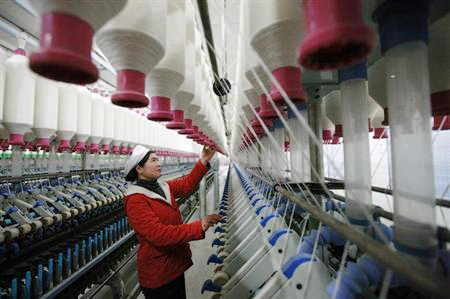China HSBC PMI recedes from two-year high to 50.4
|
 A laborer works at a textile mill in Huaibei, Anhui province Feb 1, 2013. [Photo / Agencies] |
Chinese factory activity grew at its slowest pace in four months in February as domestic demand softened, a private survey showed, supporting expectations that China's modest economic revival requires no change in monetary policy for now.
The final HSBC Purchasing Managers' Index fell to 50.4 after seasonal adjustments from January's two-year high of 52.3, in line with a flash reading in late February and above the 50-point level demarcating growth from contraction on a monthly basis.
The combination of moderate economic growth and tame price pressures reinforces bets that China will be in no hurry to abandon loose policy and raise interest rates, analysts said. Official data showed consumer inflation ran at 2 percent in January.
"The pace of the ongoing recovery is mild, implying no need for the Peoples' Bank of China to tighten policy any time soon," said Qu Hongbin, an HSBC economist in Hong Kong.
The new orders sub-index, which accounts for 30 percent of the HSBC PMI, fell to 51.4 from January's two-year-high of 53.7.
Unlike recent months when slack foreign demand for Chinese goods dampened factory businesses, domestic demand was the drag in February. Growth in export orders held up just above the 50-point mark in February, little changed from January.
Muted manufacturing growth capped inflation in Chinese factories. The input prices sub-index slipped from 16-month highs, while the output prices sub-index edged lower to hover above the 50 level.
Economists say China's gentle economic rebound should keep a lid on price pressures for the rest of 2013. A Reuters poll in January showed annual inflation is expected to hit 3.2 percent this year, even as the economy grows 8.1 percent.
But that said, analysts believe tame inflation won't last, not with China's loose monetary policy. Credit Suisse says China's central bank has printed more money in recent years than its US, European and Japanese counterparts.
It estimates China's M2 money supply as a proportion of gross domestic product is 187 percent, higher than Japan's approximately 170 percent.
Although HSBC says it seasonally adjusts its PMI to account for the Lunar New Year holiday, which falls in either January or February depending on the year, some economists still attribute data fluctuations in this period to holiday distortions.
Lu Ting, an economist at Merrill Lynch-Bank of America, said this week it is difficult for publishers of Chinese PMIs to properly adjust their data for seasonalities as most factories are shut during this time of the year, sometimes for as long as three weeks.
Extended holidays during the festive season further shrink already modest data sets that compound other data reliability problems including short histories, Lu said.
- China's manufacturing PMI drops in Feb
- Output growth hits 4-month low, says HSBC
- Manufacturing activity slows in January
- Manufacturers scramble to find workers
- China Jan manufacturing PMI falls to 50.4%
- Manufacturing turns youth off
- China's February CPI to top 3%: analyst
- China's January inflation slows to 2%






















